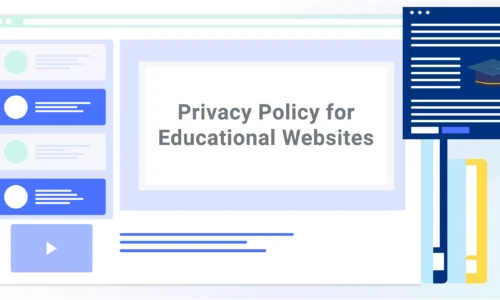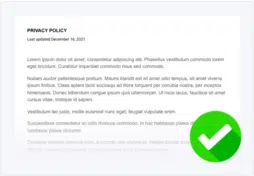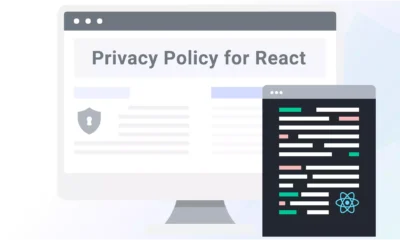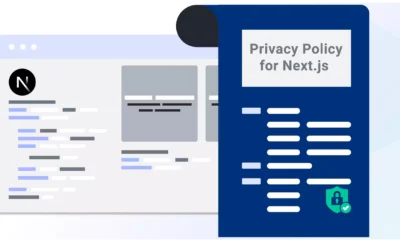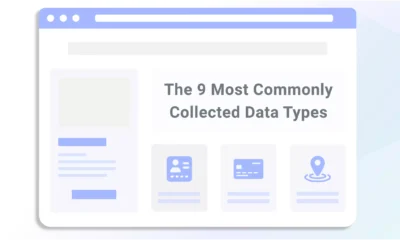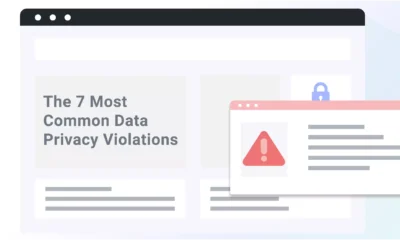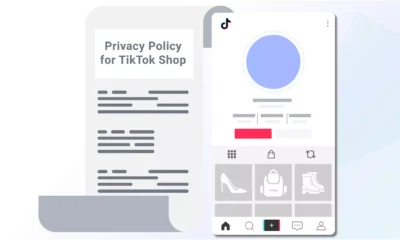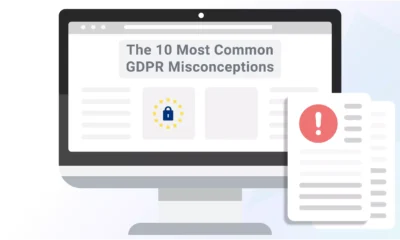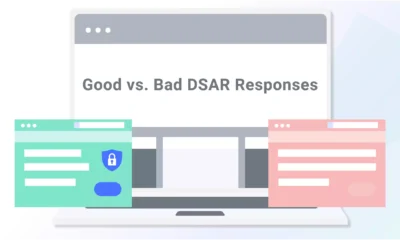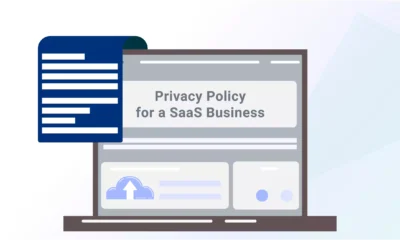Educational websites that collect personal information from users must have a privacy policy that meets specific legal requirements.
Below, I explain what goes into a privacy policy for educational websites, the laws that might impact you, where to post it on your site, and how to easily make one.
- Creating a Privacy Policy for Educational Websites
- Do Educational Websites Need a Privacy Policy?
- Educational Websites Use Personal Data
- Laws That Impact Educational Website Privacy Policies
- Information To Include in an Educational Website Privacy Policy
- Where To Display Your Educational Website’s Privacy Policy
- Summary
Creating a Privacy Policy for Educational Websites
When making a privacy policy for your education or school website, consider using an automated solution, a template, or writing on yourself.
Automated Solution
The easiest way to make a privacy policy is to use an automated solution, like Termly’s Privacy Policy Generator.
It asks straightforward questions about your business and data processing activities and then makes a unique policy based on your answers.
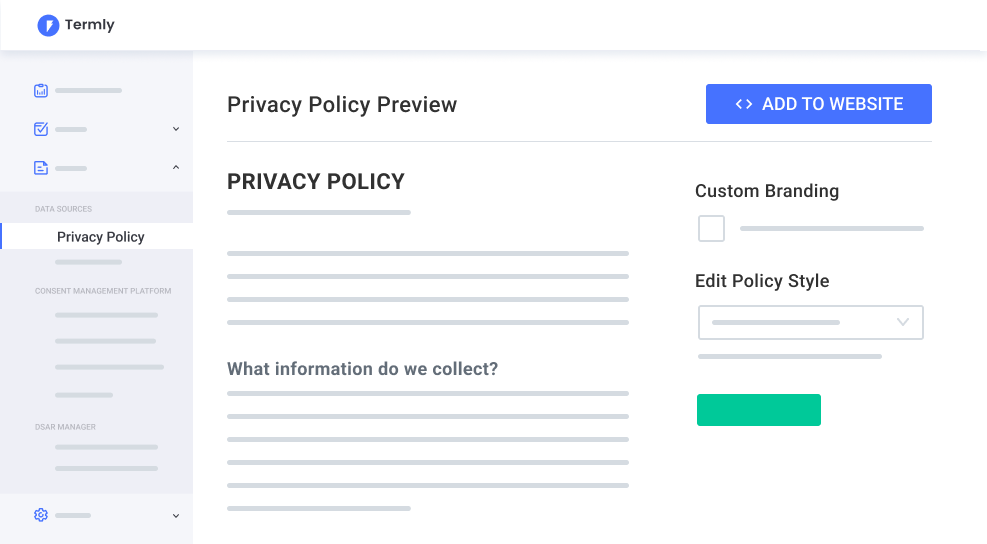
Because educational websites often target children or deal with other categories of sensitive information, you might be subject to following additional, strict laws.
When needed, consult a privacy lawyer or your data protection officer (DPO) to ensure your policy meets all legal obligations that impact your business.
Template
Consider using a privacy policy template to get a head start on making a privacy policy for educational websites.
Templates are already properly formatted for you and include a lot of standard information that belongs in most privacy policies. You just fill in blank sections with details about your business.
You can then embed it on your website and manually update it as needed whenever your processing activities change.
As a reminder, be mindful not to leave anything out, especially if your website is intended for children, as you may be subject to additional legal requirements.
DIY
You can also write your privacy policy for educational websites, but this is only recommended if you have extensive knowledge about the privacy laws that impact you.
Privacy laws still hold business accountable if you leave anything out, even by mistake.
Here are some tips you can follow if you decide to write your policy on your own:
- Tip 1: Use simple, straightforward language.
- Tip 2: Ensure you’re following all applicable privacy and industry laws.
- Tip 3: Format your policy in a way that’s easy to read.
- Tip 4: Consider having a privacy lawyer or DPO review your final policy.
- Tip 5: Include company contact information so users can reach out with questions.
Do Educational Websites Need a Privacy Policy?
Most educational websites need a privacy policy to comply with privacy laws, but it also helps build trust and keeps personal information safe.
Educational Websites Use Personal Data
Any website collecting personal information should have a privacy policy disclosing their data processing activities to keep users properly informed, and educational sites often rely on the use of personal data.
For example, online courses collect information from the students taking the class, and knowledge-based websites might have newsletter sign-ups or allow people to create logins.
Even school websites use data from students, faculty, and families.
It’s a best practice to be transparent and honest about how your site collects, processes, and uses personal data, all of which is information you can include in a compliant privacy policy.
Laws That Impact Educational Website Privacy Policies
Several laws impact the contents of an educational website’s privacy policy, but it depends on factors like your target audience, location, for-profit status, and how much data you collect.
The following consumer protection laws might apply, especially for for-profit businesses:
- General Data Protection Regulation (GDPR)
- California Consumer Privacy Act (CCPA)
- California Online Privacy Protection Act (CalOPPA)
- Australia Privacy Act 1988
- South Africa’s Protection of Personal Information Act (POPIA)
These laws outline requirements entities must follow to collect, process, and use information and directly impact privacy policies.
For example, all laws listed above obligate businesses to present users with a meaningful privacy notice that explains details including what data is being collected, the purpose for the collection, if it’s shared or sold to third parties, and the rights users have over it.
Educational websites that target children may also need to follow these child protection laws:
- Children’s Online Privacy Protection Act (COPPA)
- Family Educational Rights and Privacy Act (FERPA)
- Protection of Pupil Rights Amendment (PPRA)
These laws directly address protections and consent rules with regards to collecting and processing data from minors and can impact privacy policies.
For example, under COPPA, entities must provide an up-to-date privacy policy to legal guardians, who can make decisions on behalf of their children. You must also obtain consent from them before collecting or using any personal data from minors.
There are also consumer protection and industry laws educational websites must consider:
Because of the complexity of laws that impact educational websites, it is highly recommended that you consult a lawyer to ensure you’re meeting all applicable legal obligations.
Information To Include in an Educational Website Privacy Policy
While the specific clauses required in your educational website’s privacy policy depend on various factors, I’ve summarized the most common clauses below.
Introduction
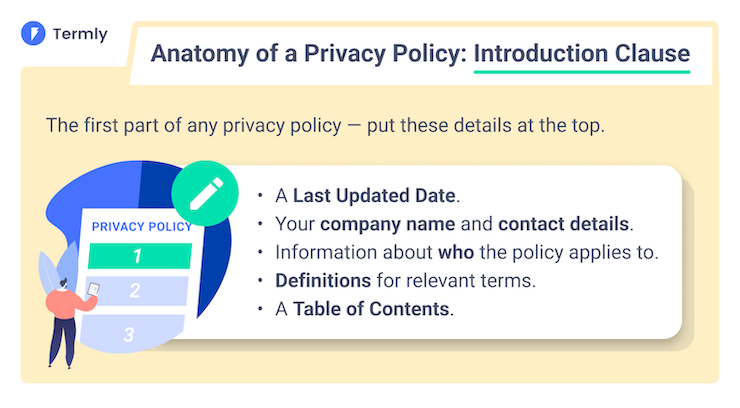
Your privacy policy should have a clear introduction section explaining who you are and who the policy affects.
Here you can also define important terms you use throughout the policy.
What Data You Collect
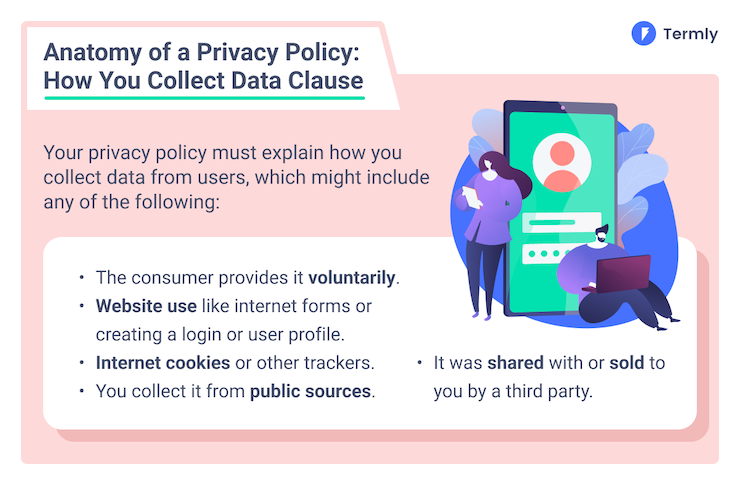
All privacy policies should include a list of personal data collected, and this information must be presented in a format that’s easy to read.
Consider listing this information in a table or bullet list, and don’t leave anything out, or you risk getting fined for violating a law.
Why You Collect the Data
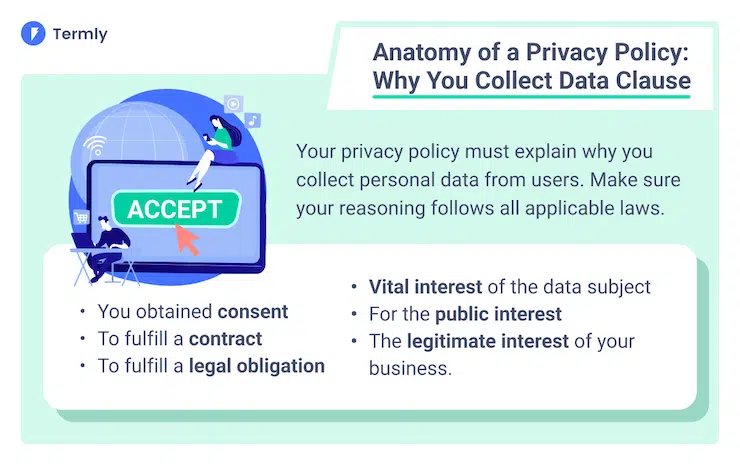
Privacy laws require you to explain why you collect personal data in your privacy policy.
Under legislation like the GDPR, you must choose from one of several pre-determined legal bases. In contrast, most U.S. privacy laws state that it must be reasonable and necessary based on the purposes as disclosed to the user.
How Data Is Collected

Some privacy laws, like the POPIA, require you to explain how you collect user data.
For example, your educational website might collect personal data through online forms, like a newsletter sign-up.
You might also rely on publicly available information, third-party data, or information collected via internet cookies and trackers.
For the sake of compliance, you must be mindful and ensure you mention every method your site uses for collecting data.
Third-Party Clause
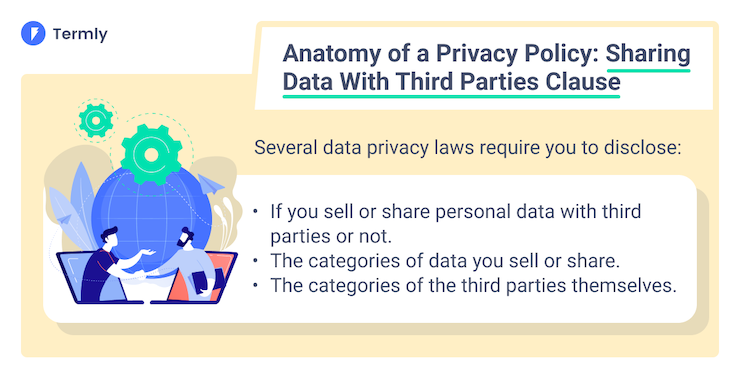
Several laws require you to disclose to users if you share or sell their data with any third parties, including the CCPA and the GDPR.
Clearly explain what data gets shared with those third parties and who the third parties are. This is also where you can explain how users can opt out of the sale or sharing of their information.
Consumer Privacy Rights
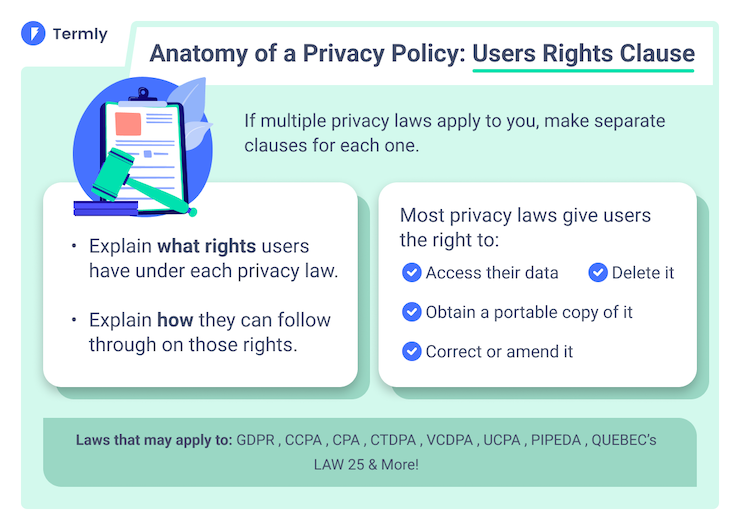
Most privacy laws require you to disclose to users in your privacy policy what rights they have over their data and how they can follow through on those rights.
If you’re subject to following multiple laws, it’s a good idea to have a separate clause for each law so protected individuals can easily find the information that applies to them.
Cookies and Other Trackers
![]()
Websites use Internet cookies and other trackers for many reasons, and they often collect personal information from users.
Add a clause in your privacy policy that explains if your site uses cookies, which ones collect data, and how users can follow through on their rights regarding that information.
You should also add a live link to your cookie policy to this section of your privacy policy.
Children’s Data
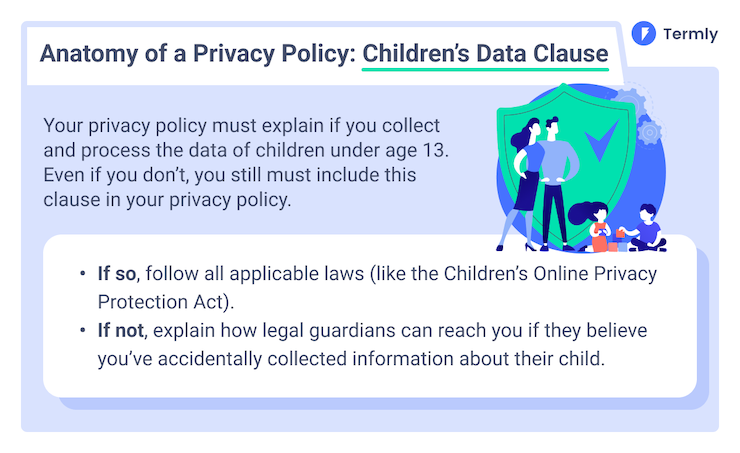
Educational sites often target children, especially public and private school websites, as well as platforms that offer programs like kids’ math programs, and their data is protected by stricter requirements, such as the COPPA.
Add a children’s data clause in your privacy policy with details for legal guardians, including how they can contact you if they believe you’ve accidentally collected data about their child.
Depending on the nature of your website, you might even consider having a separate ‘Children’s Privacy Policy’ available.
If your website is meant for minors under the age of 13 in the U.S. or under 18 in other parts of the world, take extra caution to ensure you’re following all applicable child protection laws.
Contact Information
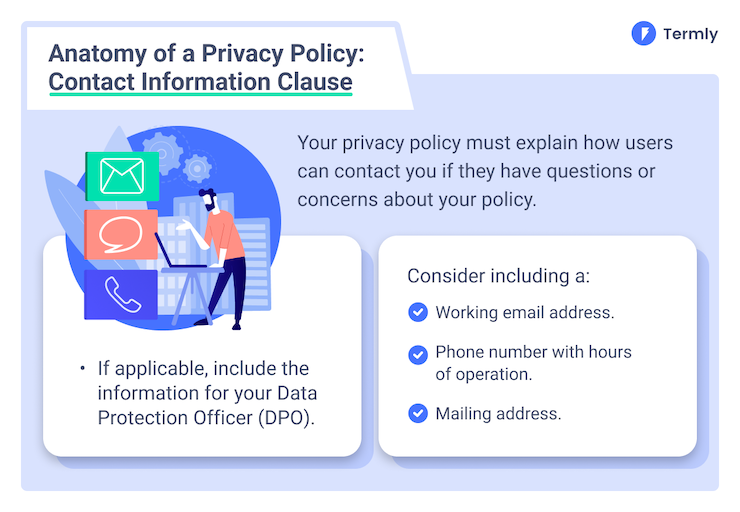
Adding your contact information to your privacy policy is essential because it helps users know how to contact you if they have questions or concerns.
Some laws explicitly require contact details in these policies, including POPIA.
You might consider including a working email address, a phone number with active times provided, or an online form that leads directly to your privacy team.
Where To Display Your Educational Website’s Privacy Policy
Display your privacy policy in the following places throughout your educational website:
- Website footer: This is a standard place to link to a privacy policy because it can be accessed no matter where a user ends up on your website.
- Login or account creation pages: These pages typically collect user data, so it’s important to post a privacy policy here.
- Newsletters/Website forms: Emails and names are forms of personal data, so add a privacy policy link to these forms.
- Payment screens: Addresses, full names, and payment information are personal data, so add a privacy policy link to these pages.
- Wherever data collection occurs: As a best practice, link to your privacy policy wherever data collection occurs so users can always make informed choices.
Summary
If you own an educational website, your privacy policy could be impacted by more than just privacy laws — consumer and children protection laws may also apply.
Ensure your policy meets all transparency and notification requirements, which includes listing all data you collect, your purpose for doing so, and details about how users can follow through on their privacy rights.
Want to get a jump start on compliance? Try using Termly’s suite of solutions to make your privacy policy in minutes.

